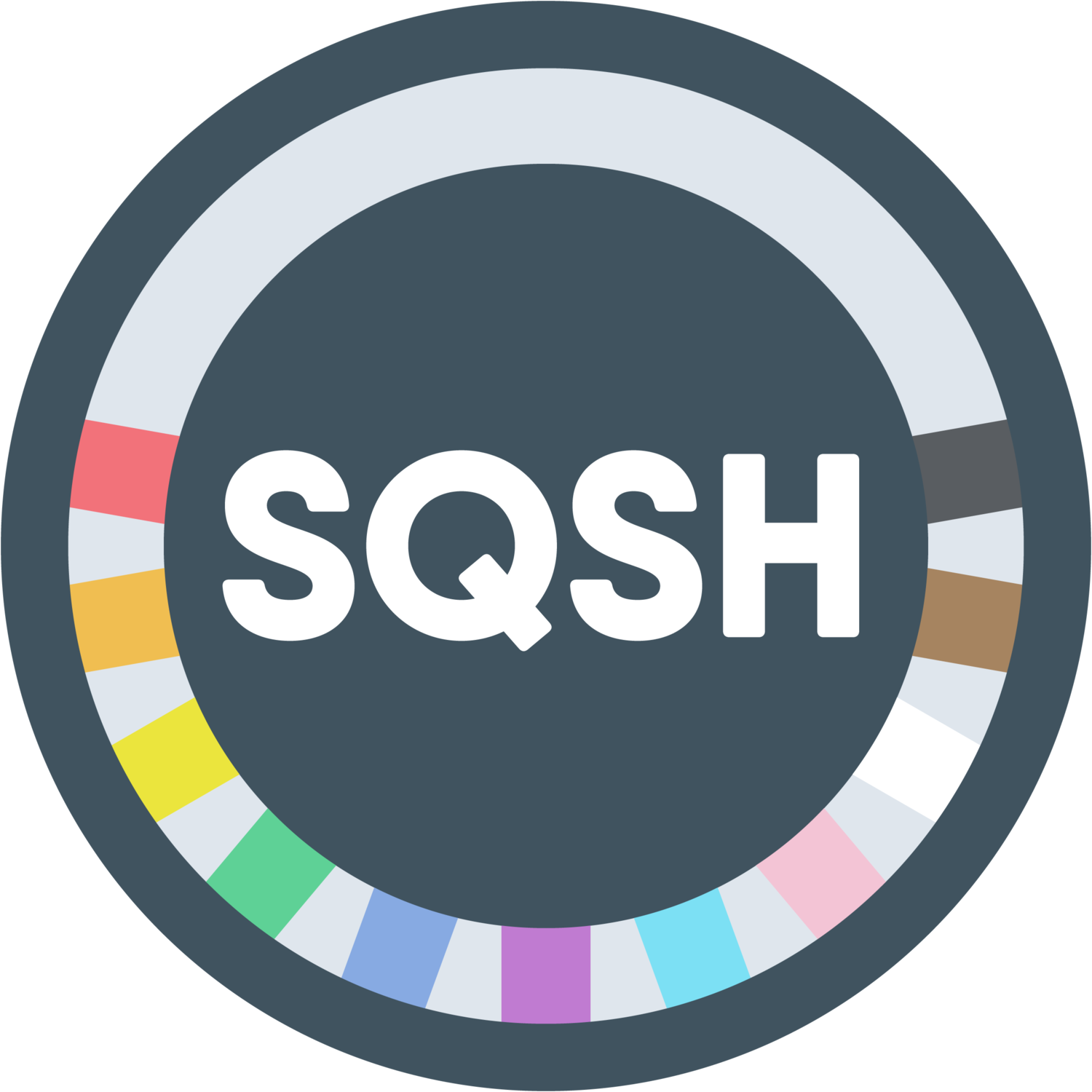
Peer Support Helpline
Call SQSH’s Peer Support Helpline to chat with a trained queer/LGBTQIA-affirming peer counselor.
Local: 314-380-7774 / Toll-free: 844-785-7774
Open Hours: Friday through Monday, 1–7pm CT
If you are in a crisis while SQSH’s Helpline is offline, please consider calling one of these hotlines.
Looking for a caring, non-judgmental listening ear? SQSH’s Peer Support Helpline offers free, confidential, and identity-affirming emotional support and resource referrals, by and for the St. Louis queer/LGBTQIA+ community.
Call anytime during our open hours (we’re open on the weekend)! Our Peer Counselors would love to chat with you.
Although we are a St. Louis-specific group, we welcome calls from anywhere in the U.S.! If you call from outside of St. Louis, our Peer Counselors are still able to provide peer counseling and emotional support, but will have to work collaboratively with you to find suitable resources in your area.

Schedule a Peer Support Call with SQSH
Do you hesitate to make calls because it’s hard to pick up the phone?
We understand how intimidating it can be to reach out to a stranger, especially for those of us with phone anxiety. To increase the accessibility of our service, SQSH launched a Call Request System in 2020! Use our Call Request Form to request a call from one of our trained Peer Counselors.
We still take all incoming calls, so if you wish to speak with a SQSH Peer Counselor right away, call us local at 314-380-7774 or toll-free at 844-785-7774 between Friday-Monday, 1.00 PM to 7.00 PM CT.
This feature was launched on October 19, 2020.

How to Use Our Helpline
SQSH’s Peer Support Helpline operates from Friday through Monday, 1:00 PM to 7:00 PM CT. Call to process emotions, talk through resources, brainstorm ideas to assist a friend or loved one, or simply have a meaningful conversation. If our Peer Support Helpline is offline but you would still like to speak with someone, we recommend using the local and national hotlines listed on our Resources page.
-
You will first hear an automated greeting. If you are in a mental health crisis, press "1" to reach Behavioral Health Response's 24/7 crisis hotline.
If you are not in a mental health crisis, press “2” or wait on the line to reach SQSH. Once connected, one of our Peer Counselors will introduce the Peer Support Helpline and share their name and pronouns. -
If you are not in a safe place to talk, the Peer Counselor will work with you to explore options where you can talk with us more safely and comfortably.
If you are in a safe place to talk, the Peer Counselor will ask how they can address you. We welcome you to provide them with your name (or a pseudonym), as well as your pronouns if you’d like. -
The Peer Counselor will then ask what you would like to talk about today. Go ahead and share as much or as little as you’d like with them! We understand that phone anxiety can make it hard to talk to a stranger over the phone. Our Peer Counselors are here to listen and create a compassionate conversational space.
-
At the end of your call, we may ask you to fill out a brief, anonymous online survey about your call experience. We value your feedback and will use it to better serve you and the rest of our community.
If you can, do something nice to take care of yourself and decompress afterwards! We welcome you to call back again anytime between Friday–Monday, 1PM–7PM CT.

When to Use Our Peer Support Helpline
What are some situations in which you might call SQSH? What are some of the day-to-day struggles faced by queer St. Louisans? Watch this short film produced by community members to find out!
In 2019-2020, callers who completed our Caller Surveys listed these reasons for calling:
Resource Referrals (29%) Housing Other Resource Referrals
Emotional Support (71%): Hard Time, Upset, Needing Someone to Talk to, Judgement-free Conversation, Recommendation from Therapist, Listening and Validation, Depression, Isolation, and Stress
“Callers reached out to us for a wide variety of resource and emotional support needs, on behalf of both themselves and/or other people in their lives. These data show caller-survey-reported reasons for calling, and common topics that came up on calls. We hope that presenting these data will help potential future callers see their needs reflected here, and feel validated that all of these reasons and more are worthy and appropriate reasons to reach out. As a peer-led helpline (and not a hotline or crisis line) there is no criteria for severity or type of issue that a caller needs to meet, and you are welcome to call for yourself or someone else.”
Peer Support Line call topics included Mental Health (15%), Housing (13%), Community Connection/Support (7%), Queer Identity (6%), Queerphobic Family/Friend/Roommate, Sexual Health (5%), Substance Use (4%), Self Harm (4%), Suicide (4%), Abuse (4%), Grounding/Coping Skills (4%), Gender Transition (4%), Coming Out (4%), Work (4%), Grief (2%), Education (2%), Physical Health (2%), Poor Queer Cultural Competency (2%), Relationship Health (2%), Religion (2%), School (1%), Race (1%), Activism (1%), and Queer-Friendly Business (1%).
Disclaimer: We are a short-term community-run peer counseling service. If you are experiencing a medical or mental health emergency, please call someone you trust, 911, 988, or one of the local or national hotlines on our Resources page first. We still welcome your call after you have received the immediate help that you need.
SQSH’s Helpline is not a substitute for long-term, professional mental health care. Please visit MTUG's list of vetted providers or our SQSHBook Resource Guide to connect with a LGBTQIA-affirming healthcare provider.

Features & Policies
Our Peer Support Helpline fills a unique niche in the St. Louis region as the only LGBTQIA-specific tele-service using a peer counseling approach. Although we are a St. Louis-specific group, we welcome calls from anywhere in the U.S.! If you call from outside of St. Louis, our Peer Counselors are still able to provide peer counseling and emotional support, but may have to work collaboratively with you to search for and find suitable resources in your area.
We operate our Peer Support Helpline based on the following principles and procedures:
-
The Helpline is online Friday through Monday, 1:00 PM to 7:00 PM CT. We set our Helpline hours on weekends because, outside of regular business hours, many folks lack access to mental health care and social support in school or work. If you had a bad week, or are just looking for someone in the LGBTQIA+ community to talk to over the weekend, call our Helpline!
-
We define peer support as the identity-affirming, relational support that peers who share similar experiences or identities are best able to provide. The source of support is a peer, a person who is similar in fundamental ways to the recipient of the support; their relationship is one of equality.
A peer is in a position to offer support by virtue of relevant experience: they have “been there, done that” and can relate to others who are in a similar situation.
-
We honor and value our callers’ life experiences, values, beliefs, and preferences and build on them as strengths. We believe that the caller is the expert who can best help themself and we will work through issues at their pace. As such, we encourage callers to direct calls in a way that is most helpful for them.
-
SQSH’s Helpline is a generally open service with no referrals required for access. Callers self-identify their need for service and are welcome to call with a variety of issues and situations. The Helpline is a resource for all LGBTQIA+ callers in St. Louis (and their family, friends, and allies), but we will not turn away any caller for not fitting this description. Other St. Louis service providers are also welcome to call on behalf of their LGBTQIA+ client(s).
-
We value our callers’ privacy and right to withhold personal information from uses that they are not aware of or do not consent to. All personally identifiable caller information is kept confidential by the Helpline Volunteer who took the call and shredded by the end of their shift. All physical notes contained non-identifiable caller information must be shredded within a month of the call. All non-identifiable information regarding calls is discussed in private only with the Helpline Team and Leadership. To learn more, read our full Confidentiality & Privacy Policy.
-
Each call will be treated as a single session (i.e. not a continuing service with a case plan). Although Peer Counselors undergo extensive, continual training, they are not qualified to provide ongoing counseling, and will thus provide referrals to outside resources if a caller requires ongoing mental health support. However, callers are welcome to use the Helpline more than once.
-
SQSH’s general policy is that we do not initiate non-consensual active rescue. We do not call 911 or the police unless a caller consents to medical or police intervention.
We follow the lead of the Trans Lifeline’s approach, which emphasizes the heightened risks of violence that trans and other marginalized (i.e. mentally ill, Black and brown, immigrant and refugee, disabled, non-English speaking) callers face in interactions with the police and other institutions.
We rely on Behavioral Health Response (800-811-4760) as our default emergency service. However, we cannot guarantee that BHR will not call 911/police if they perceive a life-threatening suicide crisis.
Learn more about SQSH’s anti-carceral approach and training for supporting suicidal callers here.
SQSH’s wish for our community is to be able to build de-carceral models and options for suicide intervention.
-
When making referrals and deciding which resources to include in our Resource Database, we prioritize resources that are LGBTQIA-affirming, such as those that have been vetted by MTUG, Trans Education Service,TransParent, or PROMO, or that have been recommended to us by community members. We will continuously update our Resources page, and welcome relevant pamphlets and brochures to assist in making referrals for callers when needed.
-
To continuously improve our service to the St. Louis LGBTQIA+ community, we ongoingly welcome feedback from Helpline users, and regularly check our feedback forms to review input from Helpline users and community members. If you’ve called SQSH recently, take our feedback survey!
-
We foster a tight-knit, supportive internal network to honor the principles of peer support within the SQSH community itself, reduce compassion fatigue, and minimize burnout. For every shift, we try to have at least two Peer Counselors on call so that one can debrief, support, and switch roles with the other after a call. Volunteers may also earn practicum hours or academic credit.

Training Curriculum
Before taking calls, all Peer Counselors undergo 50+ hours of intense training and evaluations on an extensive range of issues that queer/LGBTQIA+ callers may face. Active Peer Counselors continue to train and refresh their skills throughout the year.
Here is an outline of our 60-hour standard Peer Counselor Training:
-
Unit 1: Active Listening (Paraphrasing & Summarizing, Mirroring Language & Tone, Open-ended Questions, "I" Statements, Non-verbals & Pauses)
Unit 2: Call Structure (Check-ins, Being Caller-led, Call Flow, Building Rapport)
Unit 3: Empowerment Skills (Validating, Normalizing, Cheerleading, Mythbusting)
Unit 4: Feelings-Oriented Calls (Exploring Feelings)
Unit 5: Solution-Oriented Calls (Safety Planning, Introducing Resources, Risk Assessment, Grounding Exercises) -
Example topics include self-care, cultural humility, substance use, relationship and sexual violence, legislative landscape, and more.
-
As part of homework assignments and weekly recaps, helpline volunteers read through SQSH's Helpline Protocols Manual to learn and understand the various standard procedures we use to respond to specific call scenarios. These include:
Unit 1: Confidentiality Policy
Unit 2: Volunteer Support (Volunteer Boundaries & Triggers, Monthly Call Debriefs)
Unit 3: Standard Call Protocols (Being On Call, Intake, Outtake, Basic SQSH Information, Shift Transition, Closing)
Unit 4: Office Protocols (Opening & Closing the Office, On-Site Emergencies)
Unit 5: Non-Standard Calls (Identity Disconnect, Interruption, Personal Boundaries, Friend Calls, Repeat Caller, Abusive Caller, Homicidal Caller, Perpetrator Call, Blacklisting Policy)
Unit 6: Risk Assessment & Harm Reduction (Self-Harm, Suicide, Intoxicated Caller, Substance Use & Overdose)
Unit 7: Contacting Emergency & Reporting Services (Contacting 911 or Police Alternatives, Reporting Abuse & Neglect)
Unit 8: Phone System Procedures (Making Call-Backs, Adding a Caller to the Line, Technological Difficulties) -
Roleplays are designed for Helpline Volunteers to practice their peer counseling skills in realistic call scenarios, designed by our Helpline Trainers and written by our Roleplay Writers.
Roleplays range from 15 minutes to 1 hour, and focus on a variety of topics and peer counseling skills described above.
We source our roleplay prompts from the lived experiences of LGBTQIA+ individuals holding diverse identities, drawing from a mixture of previous SQSH calls, our personal experiences, clinical case studies, published compilations and anthologies of queer stories, scenarios shared by our community partners, and interviews with guest speakers and community members.

Helpline FAQ
If I don't identify as LGBTQIA+ or queer, can I still call?
Yes! Anyone of any sexual orientation, gender identity, or gender expression can call to receive identity-affirming peer support. Friends, family members, allies, and service providers are also welcome to call about LGBTQIA+ issues and/or how they can best support the queer people in their lives.
Who will I speak with when I call?
SQSH Peer Counselors are St. Louis area community members. Each Peer Counselor receives 60+ hours of training focused on peer counseling, cultural humility, social justice issues, relationship and sexual violence, substance use, and more. SQSH Peer Counselors are not licensed mental health professionals. Read more about our Helpline Curriculum.
I have phone anxiety. Can I still call?
Absolutely! We understand that it can be difficult to share about your life with a stranger over the phone. Our Peer Counselors appreciate the effort it takes to pick up the phone and call, and will cherish the time they get to speak with you. We welcome you to ease into the convesation at your pace when you call.
Can I call SQSH more than once?
Absolutely! While we are not a long-term professional mental healthcare service, our Peer Counselors would be happy to chat with you more than once. Since we do not keep ongoing case notes, please do not expect the Peer Counselor to have knowledge of your previous conversation(s) when you call.
Do you take calls from youth (callers under 18 years of age)?
Yes! SQSH does not have any age restrictions and anyone can call. Our Peer Counselors adopt a caller-led approach and explore issues at the caller's pace, regardless of their age or fluency with LGBTQIA+ issues. However, we would redirect crisis calls (especially from young callers) to other Hotlines listed on our Resources page, as our Peer Counselors are not trained in crisis intervention. Otherwise, SQSH welcomes calls from youth callers to chat about anything, LGBTQIA-related or not.
Can I call SQSH's Helpline even if I don't live/work in or call from St. Louis?
Yes! While we focus on serving the St. Louis LGBTQIA+ community, we take calls from anywhere and do not turn down callers who call from outside of St. Louis. We do familiarize our Peer Counselors first and foremost with St. Louis resources, so if you are looking for resource referrals outside of St. Louis, please be patient with us; our Peer Counselors may collaboratively look up resources with you on the line.
What should I do if I know someone working on your Helpline and don't want to talk to them?
There will usually be at least two Peer Counselors on call at the same time. If you call and know the Peer Counselor who answers, you can always ask to talk to the other Peer Counselor on shift. We value a connection with you and would be willing to consider making the switch.


